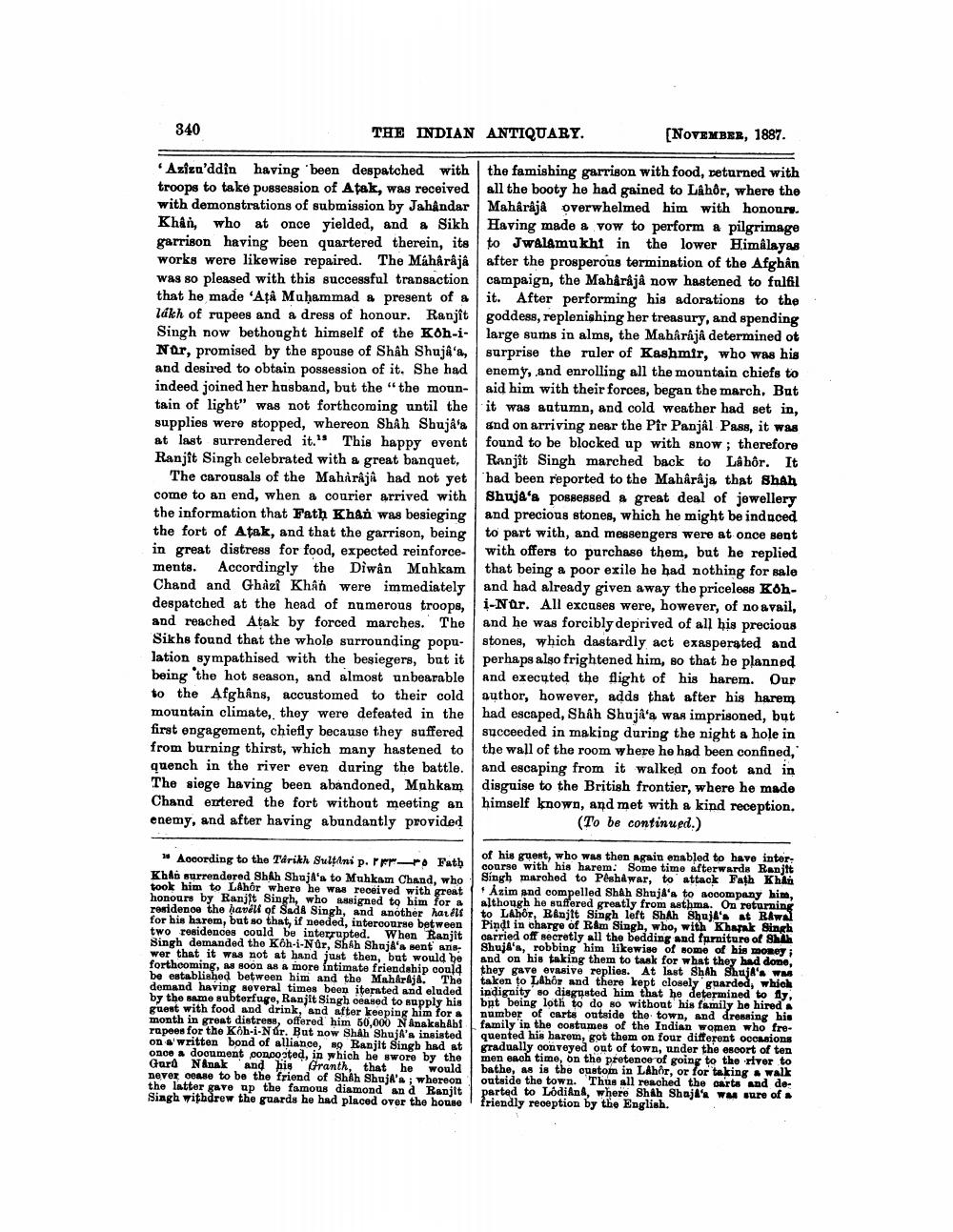________________
340
THE INDIAN ANTIQUARY.
'Aziza'ddin having been despatched with troops to take pussession of Atak, was received with demonstrations of submission by Jahândar Khân, who at once yielded, and a Sikh garrison having been quartered therein, its works were likewise repaired. The Máhârâjâ was so pleased with this successful transaction that he made 'Atâ Muḥammad a present of a lákh of rupees and a dress of honour. Ranjit Singh now bethought himself of the Koh-iNar, promised by the spouse of Shâh Shuja'a, and desired to obtain possession of it. She had indeed joined her husband, but the "the mountain of light" was not forthcoming until the supplies were stopped, whereon Shah Shujâ'a at last surrendered it. This happy event Ranjit Singh celebrated with a great banquet,
The carousals of the Maharaja had not yet come to an end, when a courier arrived with the information that Fath Khan was besieging the fort of Atak, and that the garrison, being in great distress for food, expected reinforcements. Accordingly the Diwân Mahkam Chand and Ghazi Khan were immediately despatched at the head of numerous troops, and reached Atak by forced marches. The Sikhs found that the whole surrounding population sympathised with the besiegers, but it being the hot season, and almost unbearable to the Afghans, accustomed to their cold mountain climate,, they were defeated in the first engagement, chiefly because they suffered from burning thirst, which many hastened to quench in the river even during the battle. The siege having been abandoned, Muhkam Chand entered the fort without meeting an enemy, and after having abundantly provided
According to the Tarikh Sultani p. rrrr Fath Khin surrendered Shah Shuja'a to Muhkam Chand, who took him to Lâhôr where he was received with great honours by Ranjit Singh, who assigned to him for a residence the haveli of Sada Singh, and another hazel for his harem, but so that, if needed, intercourse between two residences could be interrupted. When Ranjit Singh demanded the Koh-i-Nûr, Shah Shuja'a sent ans wer that it was not at hand just then, but would be forthcoming, as soon as a more intimate friendship could be established between him and the Maharaja. The demand having several times been iterated and eluded by the same subterfuge, Ranjit Singh ceased to supply his guest with food and drink, and after keeping him for a month in great distress, offered him 50,000 Nanakahâbf rupees for the Koh-i-Núr. But now Shah Shuja's insisted on a written bond of alliance, so Ranjit Singh had at once a document concocted, in which he swore by the Gard Nanak and his Granth, that he would never cease to be the friend of Shah Shuja'a; whereon the latter gave up the famous diamond and Ranjit Singh withdrew the guards he had placed over the house
[NOVEMBER, 1887.
the famishing garrison with food, returned with all the booty he had gained to Lâhôr, where the Mahåråjå overwhelmed him with honours. Having made a vow to perform a pilgrimage to Jwalamukhi in the lower Himalayas after the prosperous termination of the Afghân campaign, the Mahârâjâ now hastened to fulfil it. After performing his adorations to the goddess, replenishing her treasury, and spending large sums in alms, the Mahârâjâ determined ot surprise the ruler of Kashmir, who was his enemy, and enrolling all the mountain chiefs to aid him with their forces, began the march. But it was autumn, and cold weather had set in, and on arriving near the Pir Panjâl Pass, it was found to be blocked up with snow; therefore Ranjit Singh marched back to Lâhôr. It had been reported to the Mahârâja that Shah Shuja's possessed a great deal of jewellery and precious stones, which he might be induced to part with, and messengers were at once sent with offers to purchase them, but he replied that being a poor exile he had nothing for sale and had already given away the priceless Kohi-Nar. All excuses were, however, of no avail, and he was forcibly deprived of all his precious stones, which dastardly act exasperated and perhaps also frightened him, so that he planned and executed the flight of his harem. Our author, however, adds that after his harem had escaped, Shah Shuja'a was imprisoned, but succeeded in making during the night a hole in the wall of the room where he had been confined, and escaping from it walked on foot and in disguise to the British frontier, where he made himself known, and met with a kind reception. (To be continued.)
of his guest, who was then again enabled to have intercourse with his harem: Some time afterwards Ranjit Singh marched to Peshawar, to attack Fath Khan
Azim and compelled Shah Shuja'a to accompany him, although he suffered greatly from asthma. On returning to Lahor, Ranjit Singh left Shah Shuja's at Bawal Pindl in charge of Ram Singh, who, with Kharak Singh carried off secretly all the bedding and furniture of Shah Shuja'a, robbing him likewise of some of his money; and on his taking them to task for what they had done, they gave evasive replies. At last Shah Shuja's was taken to Lahor and there kept closely guarded, which indignity so disgusted him that he determined to fly, but being loth to do so without his family he hired a number of carts outside the town, and dressing his family in the costumes of the Indian women who frequented his harem, got them on four different occasions gradually conveyed out of town, under the escort of ten men each time, on the pretence of going to the river to bathe, as is the custom in Lahor, or for taking a walk outside the town. Thus all reached the carts and departed to Lódiana, where Shah Shaja'a was sure of a friendly reception by the English.




